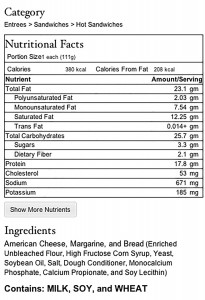Across the nation, companies are beginning to offer nutritional information for the foods and products they offer to their consumers. Checking the nutritional information of the food you consume in order to shed light on its nutritional content value is a reliable way to monitor your health and weight safely.
The nutritional guidebook stationed in the Market Place was one way Gustavus has been increasing its efforts to accommodate students. Although the guidebook was a great first step towards the goal of healthy and conscious eating, its usage was limited due to the fact that only one person was able to use it at one time.
With the ultimate goal of expanding this guidebook’s usage and availability to students, Director of Dining Services Steve Kjellgren ’86 and Registered Dietician George Elliott teamed up to create an easy-to-use website that provides nutritional information for both its daily menu items and most of the foods and recipes that are served in the Market Place.
 By clicking on any recipe, you are able to access its nutritional information-which includes common label aspects such as calories, fat grams, sodium, and overall ingredients used. Although it has most recipes labeled, more information will be added throughout the year.
By clicking on any recipe, you are able to access its nutritional information-which includes common label aspects such as calories, fat grams, sodium, and overall ingredients used. Although it has most recipes labeled, more information will be added throughout the year.
“We want the student to make the choice. That’s the beauty of the nutritional information- after getting all the information available, now they can make the most informed decision based on their needs,” Elliott said.
As well as giving students the ability to access nutritional information of their menu online, Kjellgren is also implementing a plan to install 2-3 ipads stationed in the Dining Hall that will offer direct access to the site.
“We asked ourselves, ‘How do we make this information widely available?’ These devices make it so much easier to do the work themselves if they choose,” Kjellgren said.
Offering information about the ingredients and nutrition within almost all of the recipes made in the dining hall, Dining Services is hoping that this new service will not only promote healthy eating, but will also further accommodate many student’s dietary restrictions or choices.
For students with dietary restrictions, eating in the dining hall can be difficult and frustrating. For Amanda Wood, a student with Celiac’s disease, a condition that results in gluten intolerance having nutritional information available to students is a must.
“The most common problem I run into as someone with Celiac’s disease is the fact that most of the student workers and even the leaders don’t know what went into the dishes during preparation. A lot of times, people don’t realize that even if something is wheat free doesn’t mean it’s necessarily gluten free,” Wood said. “I constantly struggle with not knowing the ingredients used in dishes I eat.”
With the ability to track the specific ingredients that go into every recipe, Kjellgren and Elliott hope that students with dietary restrictions can feel safer eating in the dining hall.
“Students are interested in what’s in the food—especially students with food allergies or intolerances. This is a way that we can give them the most accurate information, the best way we know how,” Elliott said.
“As college students, we’re kind of on our own in making sure we’re eating right, so having that information available will help students make more conscious decisions about what they’re eating,” Wood said.
In the past, Dining Services has worked to create a program such as this, even once trying a “stoplight method” when it came to labeling food.
“In the 80’s, we thought of having a program that labeled foods as green, yellow, or red; but quickly realized that was too selective and didn’t provide valuable information,” Kjellgren said.
“We wanted to make it less generic. Instead of just giving you the nutritional information of a standard hamburger, we went through and noted exactly what goes into our recipes, to give you the most accurate information,” Kjellgren said.
Although this new development is meant in the best interests of the students, the team encountered the fear that too much information may do more harm than good.
“Our thought was that if we put too much information, not only does it slow lines up, but you may make some choices made for the wrong reasons because you were too preoccupied with fat content, sodium or calories,” Kjellgren said.
To see the nutritional information for recipes, visit https://gustavus.edu/diningservices/menu/.
This site is very important and famous for Online Website Designing AND Dewelopment.
SE Software Technologies is one of the foremost software providers and providing the services of Web development and designing,
OpenCart Websites Services, WordPress Websites Services, Accounting Software, Web Hosting Services, Domain Registration, SEO/SEM,
Consultation, E-commerce solution, Content Management System (CMS).
We are providing Services in different countries from last 10 years in UK, USA, Canada, Saudi Arabia Germany and Pakistan.
The nutritious manual positioned in the Market Place was limited Gustavus has been stretching its efforts to oblige learners. Regardless of the way that the manual was a remarkable first stage towards the target of sound and aware devouring, its use was obliged in view of the way that unrivaled distinctive was fit to use it around then.